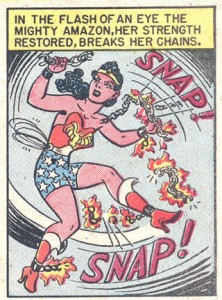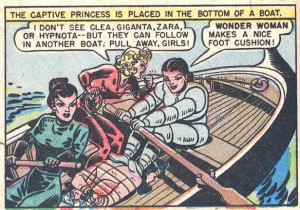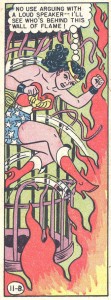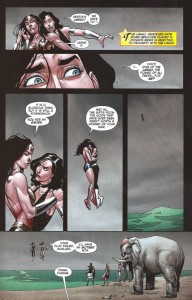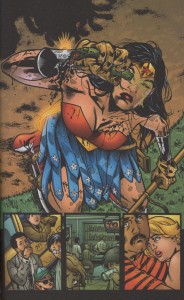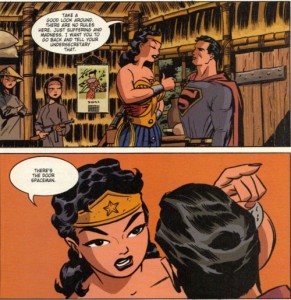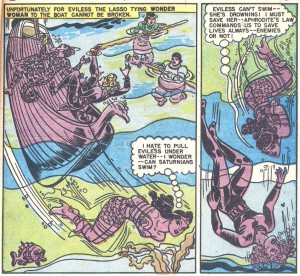This is part of a roundtable on Wonder Woman #28.
______________
Never having been much of a fan of older comics (Wonder Woman or otherwise) I have spent an embarrassingly small amount of time really thinking about how they affect the modern comics that I alternately love and hate. It’s a terrible confession for someone that loves comics and writes about them to admit to, but there it is.
So it was with interest that I dove into Wonder Woman #28 for this roundtable discussion. Though I didn’t expect to like the book much (and of course found plenty to point and laugh at/with) I was surprised to find the core of the Diana I have come to love in recent years here, in full and intact.
Sure, the book had silliness to it that sometimes made me wince the same way reading the diary of my 13-year-old self would, but there was also such love and adoration for Diana on the page. She was the hero who could save the day no matter what. She could do no wrong.
But hadn’t I read so many times that was exactly the “problem” with Wonder Woman? That she was too perfect? I wrote back in 2010 about falling in love with Wonder Woman for the first time through Gail Simone’s excellent work with Diana. And it was then that I realized there was nothing “wrong” with Diana, and nobody needed to “fix” her, despite what publishers and creators seemed to constantly think (and be tasked with). Wonder Woman had it rough simply because she was the lone marquee female superhero for a very long time. In truth, she’s still that today. Though there are a great many wonderful superheroines out there in modern comics, there is no still no other that can stand up to Wonder Woman in any sense – whether it be as IP, consistent comics history, or yes, even power profiles. But being that sole woman is a lot to bear. It means that she must be everything to everyone at all times. It means she can never make a mistake or be controversial, because to stumble when you are the only marquee female superhero sends a too universal sign about female superheroes and more importantly perhaps, women.
And so Diana became a paragon. And you can see it in Marston’s love for her in this issue. He began her as a flawless paragon, he believed her better than all others and he made her that way, over and over again. And that worked for her then, it was a different time, and it was a different way of telling stories. And surely Marston could never have imagined that she would have to hold up the superheroine mantle alone for SO long. Who can manage such a thing?
But reading Wonder Woman #28 helped me re-think what it was about the great portrayals I’ve seen of Diana over the years, and why they resonated so deeply for me. The basis for everything great I have seen of Wonder Woman in recent years was established right here and over 70 years ago. All of the stuff I love is intrinsic to her…it’s in her DNA. And it is in the reinventions of Diana that are most true to that DNA – to Marston’s original vision of her – that have resonated most strongly for me over the years. The soul of what Marston created was there in those new stories that I loved…living and breathing.
Gail Simone’s Diana was particularly compassionate and humorous. Simone found Diana’s modern woman’s heart and her sharp wit, and gave it to us over and over again.
Greg Rucka’s Diana was all honor and self-sacrifice, and Rucka took her to new heights of superheroics, giving us a Diana that broke your heart with gratitude for her very existence.
Darwyn Cooke found the powerful feminist, and gave her to us with zero apologies.
And that last one is so very important. Because some 70 years after Marston created this powerful female superhero, this bastion of femininity and power, this ode to feminism and matriarchy, we are still struggling with these issues as a society. Many readers, both male and female, still wrestle with the idea of female power. Even the idea of a matriarchal society as anything other than a horror show is counter to what so many want to accept as a possibility. And this only further emphasizes how important what Marston was doing 70 years ago truly was. It was important work, whether some of it was silly or not, because we still have not managed to catch up to him. He blazed a trail that we’re still searching for. In 2012 you can’t even write about Wonder Woman and the word feminism without the freaking Internet going boom. And that is just bizarre.
What Marston did with Wonder Woman was revolutionary for its time. But it should not be revolutionary for OUR time, and yet it is. And that alone should tell us how much further we have to go. How much more work we have to do. How much we need others to continue picking up what Marston did and carrying it forward. And there’s nothing wrong with modernizing Diana. There’s nothing wrong with updating her and re-thinking her in interesting ways, but it has to be done with a careful eye and hand and the utmost respect for what she is, where she’s been, and where she still needs to take us.
All of the things that the greatest creators of Wonder Woman since Marston managed to find and bring to the surface so beautifully over the years were there in Marston’s original Wonder Woman. They may have come cloaked in far too many villains, some over the top writing, and way way too much weird bondage for my tastes (what the hell man?!) but they’re all still there. That deep love and respect for a character – a character that is at heart the best kind of superhero a reader could hope for – it was there from the beginning and it leaves me confident that no matter what, it will never be driven out, no matter who holds the reigns (or lasso, as it were).

